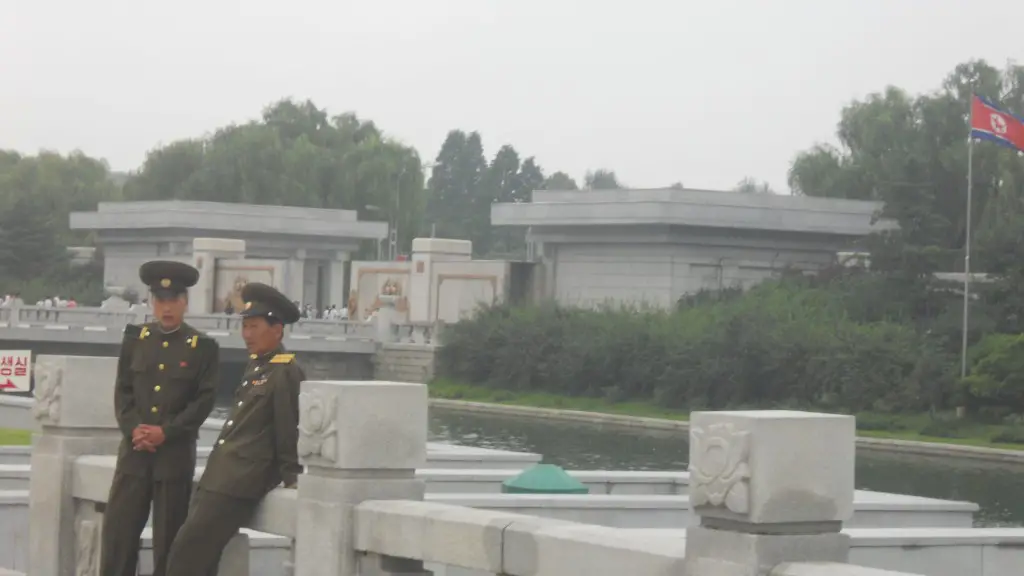North Korea has been hit by sanctions from both the United Nations and the United States for its nuclear weapons program. The sanctions are intended to pressure the country to halt its development of nuclear weapons and end its long-running war with South Korea. The sanctions imposed on North Korea are wide-ranging, and they have had an impact on the country’s economy, as well as its international relations. Here is what you need to know about the sanctions.
Sanctions Imposed by the United Nations
The United Nations Security Council has imposed a number of sanctions on North Korea since 2006. These have included an arms embargo, prohibitions on trade in luxury goods, bans on the export of coal, iron, and other resources, and financial sanctions. The aim of the sanctions is to make it more difficult for North Korea to finance its weapons program. The sanctions also aim to limit the country’s access to funds that could be used for military purposes.
The United Nations has also acted to limit North Korea’s ability to export labor abroad, and it has banned the country from importing certain weapons and nuclear-related materials. In addition, the United Nations has imposed travel bans and asset freezes on individuals and entities linked to North Korea’s nuclear and ballistic missile programs.
Sanctions Imposed by the United States
The United States has imposed its own sanctions on North Korea, some of which are in addition to those imposed by the United Nations. These sanctions are known as “secondary sanctions,” as they target entities, such as banks, in other countries that do business with North Korea. In addition, the United States has imposed “primary sanctions” on North Korea, which target firms, individuals, and government entities that are based within North Korea.
In recent years, the United States has imposed a broad range of sanctions on North Korea, including prohibitions on the import of North Korean goods, bans on North Korean ships entering U.S. ports, and an embargo on North Korean oil. The U.S. has also targeted North Korea’s access to foreign banking services, imposing restrictions on North Korean banks and freezing the assets of firms that have done business with North Korea.
Impact of Sanctions
The sanctions on North Korea have had a significant impact on the country’s economy. The restrictions on trade have reduced the country’s access to foreign goods and technology, and have made it more difficult for North Korea to generate revenue from exports. In addition, the United States’ secondary sanctions have made it difficult for North Korea to access international banking services, curtailing its ability to finance its activities and make payments for goods and services.
The sanctions have also had an impact on North Korea’s international relations. The sanctions have limited the country’s engagement with the international community and have exacerbated tensions between North Korea and its neighbors. In particular, the United States has sought to pressure China, North Korea’s closest ally, to sever its economic ties with North Korea.
Expert Perspectives
Experts are divided on the effectiveness of the sanctions on North Korea. Some argue that the sanctions have been effective in limiting North Korea’s access to resources and weakening the country’s economy. Others contend that the sanctions have had limited impact due to the opacity of North Korea’s markets, its limited engagement with the global economy, and the government’s ability to redirect funds and resources away from foreign businesses.
In addition, some argue that the sanctions have not been effective in achieving their political aims, as the North Korean government has not shown any inclination to abandon its nuclear weapons program. Others contend that the sanctions may have been successful in opening up the country to negotiations and contributing to a denuclearization process.
Reactions to Sanctions
North Korea has strongly condemned the sanctions, and has taken a number of steps to try to circumvent them. The country has sought to increase its trade with China, and has looked for ways to use cryptocurrency and other methods to access international banking services. In addition, it has continued to develop its nuclear weapons program in the face of the sanctions.
Potential Future Developments
It is unclear what the future of the sanctions on North Korea will be. There have been calls for the United Nations and the United States to consider lifting the sanctions in exchange for North Korea taking steps to denuclearize. However, North Korea has so far refused to comply with this demand, and has instead sought to expand its nuclear arsenal. As such, it appears unlikely that the sanctions will be lifted in the near future.
Options for Reaching Agreements
Given the impasse between the United States, the United Nations, and North Korea, some experts have proposed alternative approaches for reaching agreements with North Korea. These include the use of economic incentives to encourage the country to change its behavior, or the deployment of a peacekeeping force on the Korean peninsula to reduce tensions and foster dialogue. It remains to be seen whether these approaches will prove successful.
Alternative Approaches to Resolve the Conflict
In addition to sanctions and peacekeeping forces, some experts have proposed alternative ways of resolving the conflict between North Korea and its neighbors. These include regional cooperation schemes to promote economic development in the region, as well as engagement with North Korea to foster better understanding and eventually a reconciliation between the parties. Such approaches may prove to be more effective in the long term, although it is likely to be a lengthy process.
North Korea’s Perspective on the Situation
It is worth noting that there has been little public commentary from North Korea itself on the sanctions imposed against the country. While the government has repeatedly condemned the sanctions, it has also stated that it is willing to explore a “peaceful solution” to the conflict. It is possible that North Korea is using this position in an effort to win concessions from the international community, or it may be sincere in its desire to reach a peaceful resolution to the conflict.
U.S. Policy on North Korea
The United States has been clear that it is willing to negotiate with North Korea, but only if the country is willing to make significant concessions, including abandoning its nuclear weapons program. The United States has also stressed that it will not lift the sanctions until North Korea takes meaningful steps to denuclearize. It remains to be seen how the United States will respond if North Korea does not agree to these terms.
Ongoing Challenges for North Korea
The sanctions on North Korea present an ongoing challenge for the country’s economy. In addition, the restrictions on the country’s access to international markets have had the effect of limiting North Korea’s technology, undermining its ability to compete in the global economy. This could have a significant impact on North Korea’s economic future, as it is likely to struggle to find new export markets as its traditional markets are closed off due to the sanctions.
International Community’s Response to North Korea
The international community has generally backed the sanctions on North Korea, although there is some disagreement over their effectiveness. Critics argue that the sanctions are too harsh and that they are hurting the civilian population of North Korea more than they are helping. Others contend that the sanctions are necessary and will eventually lead to a resolution of the conflict.
Conclusion
The sanctions on North Korea are a complex and contentious issue, involving both global and regional powers. The sanctions have had an impact on North Korea’s economy and international relations, leading to broad consensus that they should remain in place until North Korea takes meaningful steps to denuclearize. At the same time, there is an ongoing debate over how effective the sanctions have been, and whether alternative approaches, such as economic incentives or dialogue, could be more successful. It remains to be seen how the situation will unfold in the coming months and years.




